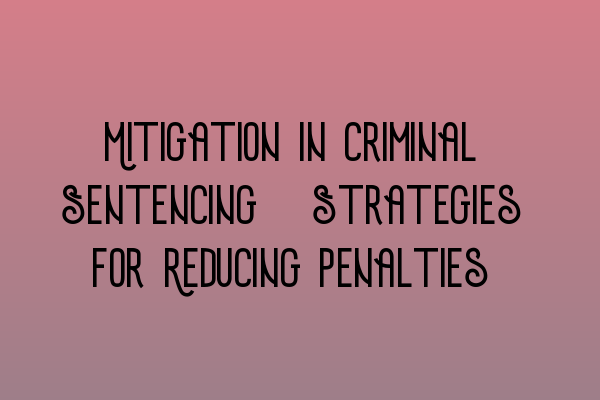Mitigation in Criminal Sentencing: Strategies for Reducing Penalties
Welcome to SQE Criminal Law & Practice Law UK! As expert solicitors in criminal law, we understand the importance of mitigation in criminal sentencing. When it comes to defending your clients and seeking favorable outcomes, the use of effective mitigation strategies can make a significant difference in reducing penalties.
Understanding Mitigation
Mitigation refers to the process of providing a court with information and arguments that may lead to a reduction in the severity of a sentence. It involves presenting evidence or factors that can help explain the circumstances surrounding the offense, reveal the defendant’s character, or demonstrate remorse and willingness to make amends.
Mitigation is not about disputing guilt or innocence but rather about persuading the court to consider leniency when determining the appropriate sentence. It can be particularly important in cases where the defendant has pleaded guilty or where the evidence against them is overwhelming.
Effective Mitigation Strategies
1. Personal Circumstances: Highlighting the defendant’s personal circumstances can be a powerful mitigation strategy. This may include factors such as their age, health, family situation, and employment history. Providing evidence that demonstrates a difficult upbringing or exceptional responsibilities can help the court understand the full context of the defendant’s actions.
2. Remorse and Rehabilitation: Demonstrating genuine remorse and a commitment to change can significantly impact sentencing. Encouraging the defendant to write a sincere apology or attend rehabilitative programs can show the court their willingness to address their behavior and prevent future offenses.
3. Cooperation and Assistance: If the defendant has cooperated with law enforcement or provided substantial assistance in the investigation or prosecution of others, it can be a valuable mitigating factor. Informing the court about any substantial cooperation can lead to a more lenient sentence.
4. Character References: Collecting character references from individuals who can speak to the defendant’s good character, reputation, and overall contribution to the community can be persuasive. These references should provide specific examples that highlight positive attributes and counterbalance the negative aspects of the offense.
5. Substance Abuse and Mental Health Issues: If the defendant struggles with substance abuse or mental health issues, addressing these matters during the sentencing can be crucial. Providing evidence of participation in treatment programs or obtaining expert opinions can help the court understand how these factors may have influenced the defendant’s actions.
Conclusion
Mitigation plays a vital role in criminal sentencing, allowing solicitors to advocate for reduced penalties based on the unique circumstances of each case. By implementing effective mitigation strategies, solicitors can help their clients secure favorable outcomes and minimize the impact of criminal convictions.
At SQE Criminal Law & Practice Law UK, we understand the intricate details of criminal law and the importance of mitigation in criminal sentencing. Our experienced team of solicitors is dedicated to providing comprehensive legal representation and strategic advice to achieve the best possible outcomes for our clients. Contact us today to discuss your case and learn more about effective mitigation strategies.
